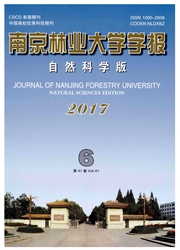

 中文摘要:
中文摘要:
为探明珙桐种子不同部位内源抑制物含量及其在层积过程中的变化情况,分别取层积12、16个月的珙桐种子,以甲醇和丙酮为提取剂,制备其种仁(胚和胚乳)、种壳的浸提液,分析各浸提液对白菜籽发芽的影响。结果表明:珙桐种仁和种壳中均含有发芽抑制物质;随着浸提液质量浓度的升高,抑制物生理活性增强;种仁浸提液抑制物的生理活性显著高于种壳浸提液;种仁甲醇浸提液抑制物的生理活性显著高于丙酮浸提液,而两种提取剂中,种壳浸提液的生理活性差异不显著。低温层积12个月再变温层积4个月后,珙桐种子内源抑制物的生理活性显著降低,但此时种仁0.09 g/m L的甲醇浸提液对白菜籽的发芽指数仍有显著的抑制作用,表明此时种仁中仍含有一定量的抑制物质。
 英文摘要:
英文摘要:
In order to know location of inhibitory substances in Davidia involucrata seeds and changes of inhibitory activity during stratification,activities of extracting solutions of D. involucrata seeds were studied after stratification for 12 and16 months. Extracting solutions of endocarps,seed endosperms and embryos( kernel) in D. involucrata were prepared by using methanol and acetone as extracting solvents. The results indicated that germination inhibitors existed in both kernel and endocarp of D. involucrata and with the increase of concentration of extracting solutions,activities of inhibitors increased too. But the inhibitory activities of kernel extracting solution were significantly higher than that of endocarp extracting solution. Besides,methanol extracting solution of seed kernel was at a higher level of inhibitory activities than that of acetone extracting solution,while no significant difference was presented in endocarps by the two extracting solutions. The inhibitory activities in seeds were decreased markedly after cold stratification for 12 months and then variable temperature stratification for 4 months. However,at this moment,germination index of cabbage seeds treated with 0.09 g / m L methanol extracting solution of seed kernel was still significantly inhibited,which indicated that some inhibitors in D. involucrate seed kernel remained strong inhibitory activity after stratification for 16 months.
 同期刊论文项目
同期刊论文项目
 同项目期刊论文
同项目期刊论文
 期刊信息
期刊信息
